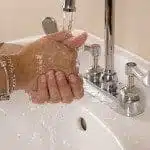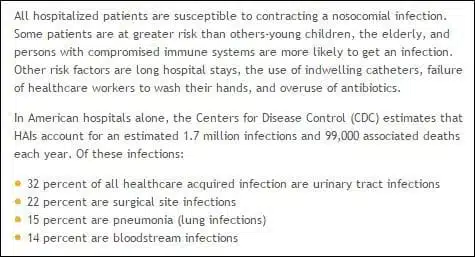SelectCare Workers Follow Universal Precautions To Prevent The Spread Of Disease
Posted in Health, NY home health care services
As the news is filled with disturbing reports about the potential spread of dangerous diseases like Ebola, healthcare workers and anyone else who cares for a sick person should familiarize themselves with universal precautions originally issued by the Center for Disease Control (CDC) in 1987. The real risk for most caretakers is not from an exotic disease, but from exposure to more common illnesses like the flu or hepatitis.
Why Follow Universal Precautions
The official list of precautions stresses wearing protective equipment (gloves, masks, gowns), washing your hands, managing needles (referred to as “sharps”), and avoiding contact with open wounds or sores. None of the rules are hard to follow, yet convincing people to do the basics such as washing hands is difficult even in hospitals, where compliance remains shockingly low. Two million healthcare associated infections and 99,000 deaths result from failure to wash hands, at a cost of $45 billion annually in the US.
The implications of these studies are personal to anyone employed in the home healthcare industry or taking care of a sick family member or friend. This means that:
- If you or other household members are caring for a sick person, familiarize yourself with universal precautions and perhaps even print and post a list of reminders
- If you hire an agency to provide in-home services, ask about their policies about following these procedures.
Guidelines for Home Healthcare Workers
Workers from SelectCare of New York who come into contact with patients are well educated in the importance of following universal precautions on the job. We advise our workers on the importance of washing hands, wearing gloves, and taking other preventive measures based on each client’s individual risk factors.
- Disposable latex gloves are the first line of defense against disease transmission when performing direct patient care such as bathing, changing diapers or when toileting, changing bed linens, doing laundry, or whenever there is a possibility of a home care worker coming into contact with a client’s bodily fluids. If a patient has a particularly contagious illness, double gloving is a good practice. Wearing gloves does not preclude the need to follow the next mandate: washing hands.
- In addition to wearing gloves, proper hand washing is just as important to prevent the transmission of infection. Because a bar of soap can carry bacteria as it may sit in stagnant water, the best practice is to use liquid antibacterial soap from the dispenser and then lather the hands – starting from the wrist and moving towards the fingertips – for 20 seconds, scrubbing between the fingers, and using a brush under fingernails.
- After washing, shut off the faucet with a towel or paper towel and even use a paper towel to open the bathroom door to prevent germ transfer.
- Using hand sanitizer is a secondary option, but agency policy requires that workers wash their hands with antibacterial soap and warm water after 5 consecutive uses of hand sanitizer.
Important Rules To Follow When Working With The Sick 
The agency also offers workers these guidelines, which are good for family members to post in the home as a reminder to exercise proper hygiene:
- Wash your hands with liquid antibacterial soap.
- Wash your hands when you enter a sick person’s home and before your touch anything that the client may use.
- Wash your hands before you leave a sick person’s home.
- Wash your hands when you first arrive at your home to prevent bringing germs into your home from public places.
- Cover your mouth when you cough or sneeze, using the inside of your elbow to minimize the amount of germs on your hands.
- Use disposable tissues rather than a handkerchief.
- When sick think “SOCIAL DISTANCING” between yourself and others so that you do not spread germs.
Contact Us For More Information
When searching for a healthcare agency that has the best interest of patients and staff mine, consider SelectCare of New York. For more information about our commitment to the highest standards of home healthcare and our concern for patients, call us today at 212-505-3640.

